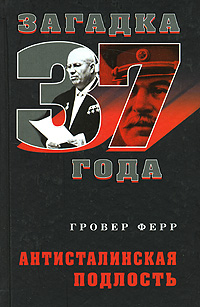A History of State Betrayal
by "Aberrationist"

A review of
Furr, G. Anti-Stalinist Villainy. Grover Furr; [translated from English by V.L. Bobrov]. Moscow: Algoritm, 2007. 464 pp. (Series: ‘The mystery of 1937’)
(translation of book review at http://aberrationist.livejournal.com/5985.html )
The author’s title for this book was something very different – the present title was the publisher’s idea, obviously borrowed from the title of IUrii Mukhin’s Antirossiiskaia podlost’ ("Anti-Russian Villainy"). Strange to tell, but the title of Mukhin’s book would have served this book even better. For the report* delivered on February 25 1956 was a blow delivered not mainly at Stalin, who had been dead for three years, but at our country. It was the first stage of the betrayal of its own people by the Party apparatus, one in which the former achievements of the country were besmirched.
It was not accidental that in August 1953 Khrushchev had restored the "envelopes" of extra pay for Party workers while increasing their size. Three weeks later, during the final minutes of the regular Central Committee Plenum, Khrushchev was elected First Secretary without any explanation of why this long-abolished title had been resurrected, without any other candidates, and without any explanation of why it was precisely he who should occupy this post. And it was this 20th Party Congress that established the leading and governing role of the Party, condemning "Stalin’s capriciousness."
Later, thanks to the wise reforms of Nikita Sergeevich, Party workers were turned into an untouchable caste – one that remains in power today despite the change of names. For Gorbachev’s "perestroika" and Eltsin’s "democracy" were but the natural consequence of the 20th Party Congress. It was clearly understood from the very beginning that the Party nomenklatura, well-fed by Khrushchev, would in time want more, and that it would inevitably conceive the idea of appropriating public property.
And in the end the communist ideology would be simply cast aside like a mask which one has grown weary of wearing. The only thing that remains unexplained is the question of whether Nikita Sergeevich consciously intended the death of the Soviet system, or whether he acted simply out of his own stupidity.
* * *
The book itself consists of an examination of the false assertions in the report* "On the Cult of Personality and Its Consequences." The author has found sixty-one such false assertions in the report. These assertions are organized into ten chapters, according to their subject matter. In the remaining two chapters the author attempts to challenge the justification for the rehabilitation of some individual persons, outlines the obvious consequences of the report, and considers what might have prompted Khrushchev to take such a step.
The author has not worked in the archives. However, he refers very frequently to collections of primary documents, especially to collections published by the "International Democracy Fund."** As a whole the evidentiary base is a reliable one.
The book is structured in an interesting manner. First there are the chapters, then the report "On the Cult of Personality..." is reproduced in its entirety. Then follow the sources to each of the chapters. These sources are greater in length than the text of the book itself. The sources consist of documents and quotations from various works to which the author refers.
It’s not completely clear why they were not all included in the main text of the chapters and why, therefore, the book had to assume such a strange structure. However, in some ways this structure is convenient. If one wants to find a certain document one doesn’t have to search for it in the text but can find it in the Appendix.
A distinguishing feature of the book is the fact that the author has tried to give internet references for almost all of the sources. He has personally scanned many documents and put them up on his own web page. In practice this is very convenient – if you want to read the confessions of Frinovsky or Ezhov, a speech by Stalin or Khrushchev, you just need to type the URL into your web browser and download the PDF file with the document you want. This kind of thoroughness and attention to the reader’s needs merits our respect.
* * *
The author of the book is an American professor from Montclair State University (State of New Jersey). The author knows Russian and makes reference mainly to Russian language sources – something that at first surprised me. First it was American historian Mark Tauger who surprised me with his mastery of Russian and fine knowledge of the subject, and now here’s Grover Furr as well.
In addition to all this, the author is even shows profound sympathy to the world communist movement. For some reason I had thought that people like this were just not to be found in today’s America. But this researcher regularly exposes even more anticommunist falsifications.
On top of this the author has his own web page with links to his own articles, stores where one can buy his book, and reviews of it. One thing that especially surprised me is the fact that, when someone scanned his book and put it on the web, the author wrote on his own web page that he considered this a compliment and thanked the person who had scanned his book. There’s a good fellow!
He has evidently been at this activity for quite a long time since I found on his web page an article on Marshal Tukhachevsky that is dated 1988. At that time, when "perestroika" madness was raging among us, the bloody repressive regime was being showered with curses, and a wave of love for the United States was raging, this American professor was trying to show that Stalin’s punishment of the military commanders condemned in 1937 was a just one. This professor is a very honest man.